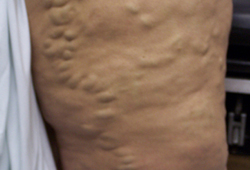Summary
Definition
History and exam
Key diagnostic factors
- dilated tortuous veins
Other diagnostic factors
- leg fatigue or aching with prolonged standing
- leg cramps
- restless legs
- hemosiderin deposition
- corona phlebectatica
- itching
- lipodermatosclerosis
- ankle swelling
- ulceration
- bleeding from varices
Risk factors
- increasing age
- family history
- female sex
- increasing numbers of births
- deep vein thrombosis
- occupation with prolonged standing
- obesity
Diagnostic investigations
1st investigations to order
- duplex ultrasound
Treatment algorithm
symptomatic superficial vein insufficiency, no evidence of peripheral vascular disease or superficial axial truncal insufficiency: tributary insufficiency only
symptomatic superficial vein insufficiency, no evidence of peripheral vascular disease or superficial tributary insufficiency: truncal axial insufficiency only
symptomatic superficial vein insufficiency, no evidence of peripheral vascular disease: truncal axial and tributary insufficiency
symptomatic superficial vein insufficiency, no evidence of peripheral vascular disease: perforator veins with reflux located near healed or active venous ulcers
deep vein insufficiency without superficial truncal vein insufficiency but with superficial tributary insufficiency
deep vein insufficiency with superficial truncal vein insufficiency
deep vein insufficiency without superficial vein insufficiency
deep vein obstruction
Contributors
Authors
Alun H Davies, MA, DM, DSc, FRCS, FHEA, FEBVS, FACPh
Professor of Vascular Surgery and Honorary Consultant Vascular Surgeon
Department of Surgery and Cancer
Imperial College London
Imperial Vascular Unit
Imperial College Healthcare NHS Trust
London
UK
Disclosures
AHD declares that he has no competing interests.
Tristan RA Lane, MBBS, BSc, PhD, FRCS
Consultant Vascular Surgeon
Cambridge Vascular Unit
Addenbrooke's Hospital
Cambridge University Hospital Trust
Cambridge
Honorary Senior Clinical Lecturer, Section of Vascular Surgery
Department of Surgery and Cancer
Imperial College London
UK
Disclosures
TRAL declares that he has no competing interests.
Acknowledgements
Professor Alun Davies and Mr Tristan Lane would like to gratefully acknowledge Dr Luis R. Leon Jr, Dr Maureen K. Sheehan, and Dr Boulos Toursarkissian, previous contributors to this topic.
Disclosures
LRL, MKS and BT declare that they have no competing interests.
Peer reviewers
Paul Tisi, MBBS, MS, FRCSEd
Medical Director/Consultant Vascular Surgeon
Bedford Hospital
Bedford
UK
Disclosures
PT declares that he has no competing interests.
Nick Morrison, MD, FACS, FACPh
Director
Morrison Vein Institute
Scottsdale
AZ
Disclosures
NM declares that he has no competing interests.
Peer reviewer acknowledgements
BMJ Best Practice topics are updated on a rolling basis in line with developments in evidence and guidance. The peer reviewers listed here have reviewed the content at least once during the history of the topic.
Disclosures
Peer reviewer affiliations and disclosures pertain to the time of the review.
References
Key articles
Kakkos SK, Gohel M, Baekgaard N, et al. Editor's choice - European Society for Vascular Surgery (ESVS) 2021 clinical practice guidelines on the management of venous thrombosis. Eur J Vasc Endovasc Surg. 2021 Jan;61(1):9-82.Full text Abstract
Gloviczki P, Lawrence PF, Wasan SM, et al. The 2022 Society for Vascular Surgery, American Venous Forum, and American Vein and Lymphatic Society clinical practice guidelines for the management of varicose veins of the lower extremities. Part I. Duplex scanning and treatment of superficial truncal reflux: endorsed by the Society for Vascular Medicine and the International Union of Phlebology. J Vasc Surg Venous Lymphat Disord. 2023 Mar;11(2):231-261.e6. Abstract
National Institute for Health and Care Excellence. Varicose veins: diagnosis and management. July 2013 [internet publication].Full text
De Maeseneer MG, Kakkos SK, Aherne T, et al. Editor's choice - European Society for Vascular Surgery (ESVS) 2022 clinical practice guidelines on the management of chronic venous disease of the lower limbs. Eur J Vasc Endovasc Surg. 2022 Feb;63(2):184-267.Full text Abstract
van der Velden SK, Biemans AA, De Maeseneer MG, et al. Five-year results of a randomized clinical trial of conventional surgery, endovenous laser ablation and ultrasound-guided foam sclerotherapy in patients with great saphenous varicose veins. Br J Surg. 2015 Sep;102(10):1184-94. Abstract
Brittenden J, Cooper D, Dimitrova M, et al. Five-year outcomes of a randomized trial of treatments for varicose veins. N Engl J Med. 2019 Sep 5;381(10):912-22. Abstract
Gohel MS, Heatley F, Liu X, et al. A randomized trial of early endovenous ablation in venous ulceration. N Engl J Med. 2018 May 31;378(22):2105-14.Full text Abstract
Brittenden J, Cotton SC, Elders A, et al. A randomized trial comparing treatments for varicose veins. N Engl J Med. 2014 Sep 25;371(13):1218-27.Full text Abstract
Reference articles
A full list of sources referenced in this topic is available to users with access to all of BMJ Best Practice.

Differentials
- Telangiectasias
- Reticular veins
More DifferentialsGuidelines
- ACR appropriateness criteria®: lower extremity chronic venous disease
- European Society for Vascular Surgery (ESVS) 2022 clinical practice guidelines on the management of chronic venous disease of the lower limbs
More GuidelinesPatient information
Varicose veins: what are they?
Varicose veins: self-help
More Patient informationLog in or subscribe to access all of BMJ Best Practice
Use of this content is subject to our disclaimer